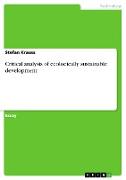Critical analysis of ecologically sustainable development
BücherAngebote / Angebote:
Essay from the year 2004 in the subject Environmental Sciences, grade: HD, Murdoch University (ISTP - Institute for Sustainability and Technology Policy), course: Ecologically sustainable development, 22 entries in the bibliography, language: English, abstract: QUESTION I-I: Based on the various readings and websites what, if any, seem to be the core 'agreed' principles of sustainable development and what are the key areas that are contested? Regretfully, the umbrella-term "sustainable development" is increasingly being used indiscriminately and arbitrarily, in both the scientific and the political discussion of sustainable development. The concept thus encourages increasingly arbitrary 'definitions'. For logical reasons, any concept which has to encompass almost everything (extension) must lose specific meaning (intension). However, after more then twenty years of debate about the term, one can identify an ethical profound core meaning as well as some clear contoured basic conceptions of "sustainability"1. The debate about "sustainability" refers, on a high grade of abstraction, to a way of life and economic manners that are capable for the future and which are grounded in moral obligations towards future generations and their life prospects. Thus, the orientation at intergenerational equity is constitutive for "Sustainability". In each conception of "Sustainability" there has to be answered the question which kinds of inheritance belong to a intergenerational legacy. To the pure moral perspective that deals with the question, if there are obligations towards future generations at all (e.g. Partridge 1990, Howarth 1992), there must in concreto be added power of judgement and reasoning that say something about kind, extend, and contend of the legacy. Here one moves in a scope discretion. [...]
Folgt in ca. 10 Arbeitstagen


